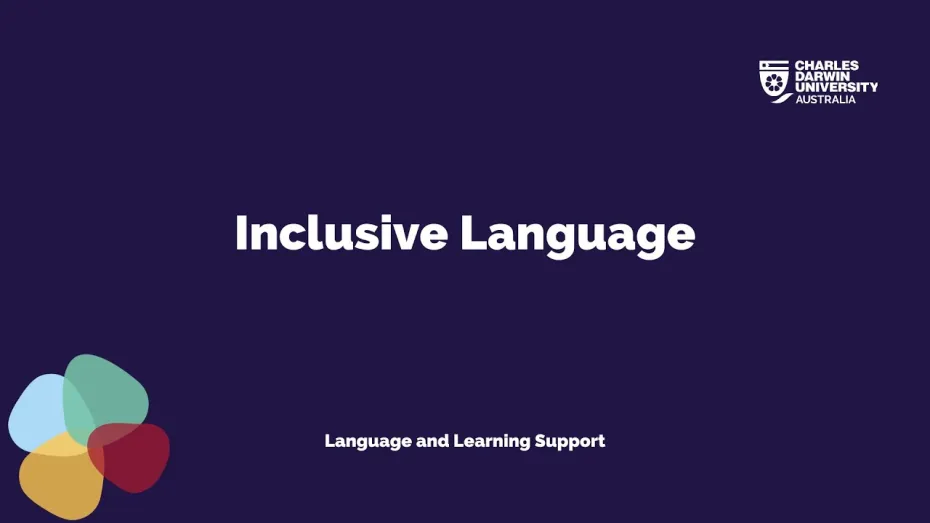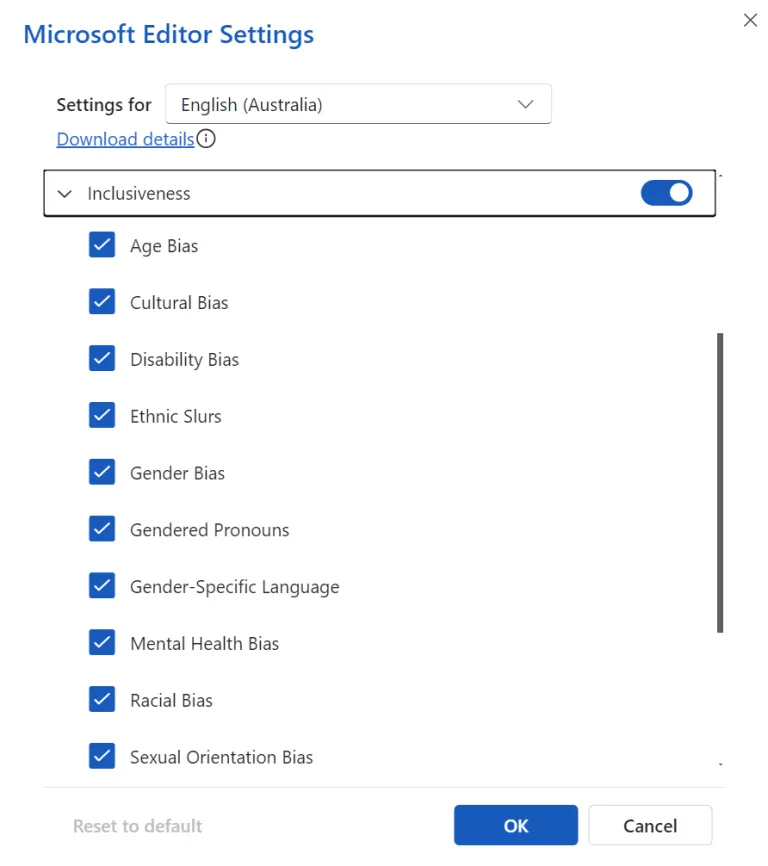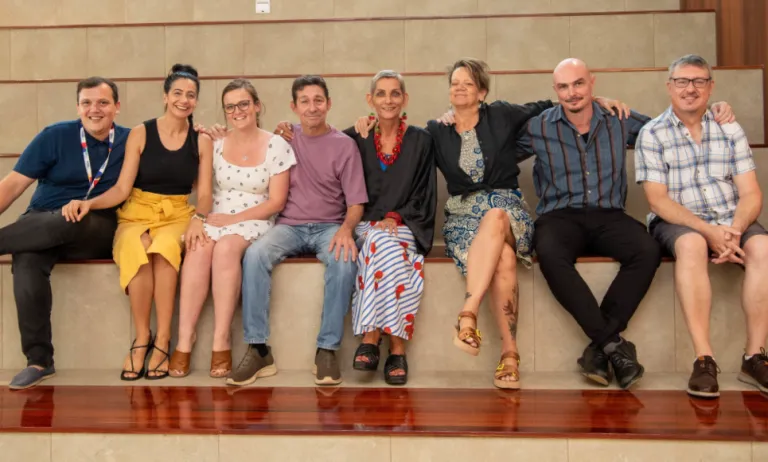Inclusive language is spoken or written language that avoids bias. Bias means having unfair positive or negative feelings towards somebody or something. Bias can be explicit (open and obvious) or implicit (suggested and less obvious) and it can be based on ethnicity, race, gender, socioeconomic status and capabilities. You may find it difficult to notice non-inclusive language because some examples are common in some everyday situations, and we may be used to them. However, you must avoid them. So, as a CDU student you need to learn what is non-inclusive language and actively avoid it. You can do this by being respectful of everyone in our community, and learning about and using inclusive language when you refer to others.
Before you continue, take a couple of minutes to watch this video:
This page will help you understand the importance of Inclusive Language and especially how:
- to understand concepts and principles underlying Inclusive Language
- to avoid biased expressions and be sensitive to others’ feelings
- to be aware of hidden biases and sensitive issues sometimes expressed in spoken and written communication
- to use Inclusive Language in day-to-day conversation and in the university context
Download this summary sheet for your own reference.
Inclusive language and hidden biases
This section will give you an overview of inclusive and non-inclusive language.
Self evaluation
Before you start, reflect on your understanding of inclusivity and inclusive language based on:
- Situations in the past which made you or others feel 'not included'.
- Situations where you made and expressed assumptions about people or individuals which proved to be wrong.
Why use Inclusive Language?
What we say and the words we use can have a negative impact on others. It is important that we recognise the importance of our words when we interact with people. The language we use must be free from biases, limitations, stereotypes and other forms of social exclusion. We can promote a safe and successful environment by considering how others would react to the language we use. We want to make sure that everyone feels accepted, acknowledged and respected.
- Task: Vocabulary testing. Look at the definitions of stereotype, accessibility, marginalisation, inclusion, equity, and bias. Then drag and drop the best definition to each of the words.
Avoiding the language pitfalls of hidden biases
Hidden biases, also called implicit biases, appear in our language when we express judgement and attitudes towards people or groups and associate them with stereotypes. They are 'hidden' because we use them unintentionally. This type of language has often become so common that we tend to forget how it can impact on individuals or groups. For example, we can make assumptions by associating jobs and careers to a gender or by listening to someone speak in a particular accent.
The Impact of bias in our language
Bias in our language can subtly influence our perceptions and interactions, often without our awareness. Such biases can reinforce stereotypes and perpetuate social inequalities. For example, describing someone as "articulate" might imply surprise at their eloquence based on their race or background, inadvertently revealing a biased expectation. These linguistic habits can affect how people view themselves and others, shaping societal norms and expectations.
Writing in a culturally and socially responsible way
Before we submit a piece of writing for any purpose, we should check that any terms referring to race, ethnic groups, sexual orientation, etc. that we used are terms currently accepted and preferred as inclusive and non-ambiguous. Sometimes, our language use may not necessarily come from hidden biases but simply from a lack of awareness that certain terms may be out of date and more inclusive expressions are in use.
- Task: Writing in a culturally sensitive and responsible way. Read the sentences below which include non-preferred words and expressions and click on the hotspots to check which are the preferred and more current ones.
Inclusive language in context
- Task: Inclusive language in context. Work on the activities to check your new understanding of the use of inclusive language in context.
- Task: Other contexts of use of inclusive language. Now complete the multiple-choice activity below to learn more about how to avoid using non-inclusive language inadvertently.
A-Z of First Nations Terms: Student Guide
A-Z of First Nations Terms Student Guide (PDF, 1.46 MB)
Many courses at CDU have units with an Indigenous perspective embedded in the curriculum. This means you frequently research and write about issues related to First Nations peoples.
It is important to be both accurate and appropriate when using terms to discuss Indigenous issues. This shows respect and also reveals knowledge of one of the oldest cultures in the world.
The A-Z of First Nations terms is a useful resource to refer to when writing your assignments. It has been developed in collaboration with CDU staff from First Nations Leadership and First Nations Students and Engagement, so it is an authoritative source of information.
We recommend downloading it and referring to it to check you have accurately and appropriately used First Nations terms.
Applying your learning
Reflect on what you have learned in this material and consider how you can use it in your own work.
Useful Strategies
- Always be mindful of the language you use in all contexts when you interact with or address people you do not really know by avoiding gendered terms and making assumptions based on their appearance.
- Be careful with citing sources as examples of discrimination and racism and make sure that statements and quotations belonging to these sources are appropriately signaled as such and distinguished from your own thoughts.
- Re-read an assignment you are drafting.
- Make sure you use the appropriate terms to refer to groups of people which are not 'exclusive', discriminatory or single them out in a negative way.
- Avoid using stereotypical expressions which exaggerate groups’ characteristics.
- Use a language that is respectful and clear when dealing with sensitive issues such as instances of discrimination, and episodes of injustice against minorities or diverse peoples.
Microsoft Editor
Microsoft Editor is a writing assistant tool developed by Microsoft to help users improve their writing. It is available as part of Microsoft 365 and integrates with popular Microsoft applications such as Word and Outlook, as well as providing browser extensions for Microsoft Edge and Google Chrome.
By setting the editor function to look for the items as shown in the image below, you will be alerted if you inadvertently use non-inclusive language.
Next Steps
Reflect on your learning
- Revisit the self analysis quiz at the top of the page. How would you rate your skills now?
- Remember that the learning process includes making mistakes. They are a normal part of learning and can help you to improve. If you would like more support, visit the Language and Learning Support page.
Did you know CDU Language and Learning Advisors offer a range of study support options?
https://www.cdu.edu.au/library/language-and-learning-support


